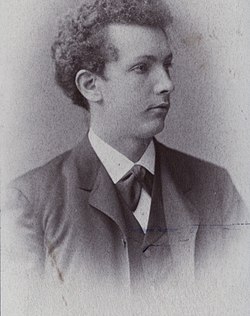| "Zueignung" | |
|---|---|
| Lied by Richard Strauss | |
 The composer in 1886 | |
| English | Dedication |
| Opus | 10 |
| Text | Poem by Hermann von Gilm |
| Language | German |
| Composed | 1885 |
| Dedication | Heinrich Vogl |
| Scoring | Voice and piano |
"Zueignung" (translated as "Dedication" or "Devotion") is a Lied composed by Richard Strauss in 1885 (completed 13 August), setting a poem by the Austrian poet Hermann von Gilm. It was included in Strauss's first published collection of songs, as Op. 10 in 1885. Originally scored for voice and piano, the song was orchestrated in 1932 by the German conductor Robert Heger and in 1940 by Strauss himself. It is one of the composer's best-known songs.

